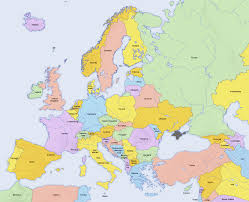记忆方法
为了记住“Europe”,可以采用联想记忆法:
1. 联想“欧”字与“罗盘”中的“E”,想象地球罗盘指向欧洲的方向。
2. 将“urope”分解为“eu”加上“rape”,其中“eu”与“欧”相似,而“rape”暗示了一个地名的形状,就像欧洲的轮廓。
3. 或者,联想到“欧洲”是一个由多个国家组成的大陆,可以想象一个由字母“E”展开的地图,表示“Europe”的范围。
通过这样的联想,单词“Europe”的形状、含义和地理概念会更容易被记住。
1. 联想“欧”字与“罗盘”中的“E”,想象地球罗盘指向欧洲的方向。
2. 将“urope”分解为“eu”加上“rape”,其中“eu”与“欧”相似,而“rape”暗示了一个地名的形状,就像欧洲的轮廓。
3. 或者,联想到“欧洲”是一个由多个国家组成的大陆,可以想象一个由字母“E”展开的地图,表示“Europe”的范围。
通过这样的联想,单词“Europe”的形状、含义和地理概念会更容易被记住。
以上内容由AI生成, 仅供参考和借鉴
中文词源
Europe 欧洲
据说是来自古希腊神话宽脸美女Europe的名字。euro-, 宽的,词源同aneurysm, eurypterid. -ops, 眼睛,脸,词源同optical,cyclops.
英语词源
- Europe
- from Latin Europa "Europe," from Greek Europe, which is of uncertain origin; as a geographic name first recorded in the Homeric hymn to Apollo (522 B.C.E. or earlier):
"Telphusa, here I am minded to make a glorious temple, an oracle for men, and hither they will always bring perfect hecatombs, both those who live in rich Peloponnesus and those of Europe and all the wave-washed isles, coming to seek oracles."
Often explained as "broad face," from eurys "wide" (see eury-) + ops "face," literally "eye" (see eye (n.)). But also traditionally linked with Europa, Phoenician princess in Greek mythology. Klein (citing Heinrich Lewy) suggests a possible Semitic origin in Akkad. erebu "to go down, set" (in reference to the sun) which would parallel orient. Another suggestion along those lines is Phoenician 'ereb "evening," hence "west."
权威例句
- 1. Kaspar had spoken know-ledgeably about the state of agriculture in Europe.
- 卡斯帕对欧洲农业状况发表了一番颇有见地的见解。
- 2. He is one of the most wanted criminals in Europe.
- 他是欧洲最重要的通缉犯之一。
- 3. Physical and ideological barriers had come down in Eastern Europe.
- 物质和意识形态上的障碍在东欧已不复存在。
- 4. The issue threatened to decouple Europe from the United States.
- 这一问题可能会割裂欧洲同美国的关系。
- 5. A wave of immigrants is washing over Western Europe.
- 移民潮正席卷西欧。
